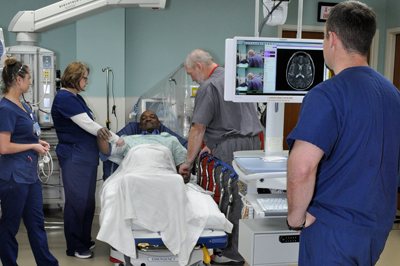Sacred Heart designated a remote stroke center
June 23, 2019
LAVONIA, Ga. – St. Mary’s Sacred Heart Hospital has been designated as a Remote Treatment Stroke Center by the Georgia Department of Public Health Office of EMS and Trauma.
St. Mary’s Sacred Heart Hospital emergency department staff and physician demonstrate the REACH telestroke system.
The designation recognizes Sacred Heart’s quality care for stroke patients, especially its use of telemedicine to provide state-of-the-art emergency treatment locally. Using the REACH telestroke system, doctors at Sacred Heart can consult in real time with specialists at Augusta University Medical Center to administer a powerful clot-busting drug that can stop many strokes in their tracks.
“The Department commends you and your staff for the commitment to excellence in stroke care that is being provided by your facility,” said Kathleen Toomey, MD, Georgia’s Public Health Commissioner and State Health Officer, in a letter announcing the designation. “Reducing the incidence and the impact of strokes on individuals in Georgia is exceedingly important.”
“We are honored to be designated as a Remote Treatment Stroke Center,” said Jeff English, President of St. Mary’s Sacred Heart Hospital. “The certification process is demanding and highly detailed. I’m proud of our medical staff, hospital staff, and our partners in EMS for their commitment to providing quality care for our patients and our community.”
Stroke is a medical emergency
Stroke is the nation’s leading cause of disability and one of the leading causes of death. Georgia is the core the nation’s “stroke belt” – a swath of states from Virginia to Texas in which stroke is significantly more common than in other parts of the U.S.
In a stroke, blood flow to part of the brain is interrupted by a blood clot or torn blood vessel. Brain cells “downstream” become stressed and up to 2 million die per minute, damaging any function handled by that part of the brain. For the 80 percent of patients whose stroke is caused by a blood clot, treatment with the clot-busting drug Alteplase can stop the stroke in its tracks and even reverse some effects. But time is critical: in most cases, the drug must be given within about three hours of the onset of symptoms to be effective.
That’s why, when a patient with stroke symptoms arrives at Sacred Heart, the emergency department team goes into high gear. If initial testing shows that a stroke is likely, the physician can activate the REACH telestroke system to start a real-time virtual consultation with a stroke specialist at Augusta University Medical Center. Through REACH, the specialist can talk to the patient, physician and nurses; conduct a visual exam; view CT scans and other imagery, and review lab results.
“REACH brings the full knowledge and skill level of board-certified neurologists to Sacred Heart 24 hours a day, seven days a week,” English said.
The REACH consultation helps Sacred Heart physicians know if the stroke is being caused by a blood clot and if Alteplase is likely to be safe and effective.
“Alteplase is the most powerful front-line tool we have in the treatment of ischemic stroke, and it can actually reduce or prevent damage to the brain,” said Tyler Davison, manager of Sacred Heart’s Emergency Department. “It’s vital that it be administered correctly and only to patients who meet rigorous safety guidelines. Our association with Augusta University Medical Center and St. Mary’s allows us to do that.”
Warning signs of stroke
In a stroke, time is brain. It’s essential to call 911 as soon as symptoms appear:
- Sudden numbness or weakness of the face, arm or leg, especially on one side of the body
- Sudden confusion, trouble speaking or understanding
- Sudden trouble seeing in one or both eyes
- Sudden trouble walking; dizziness, loss of balance or coordination
- Sudden severe headache with no known cause
For more information about stroke, visit the American Stroke Association at www.strokeassociation.org.
